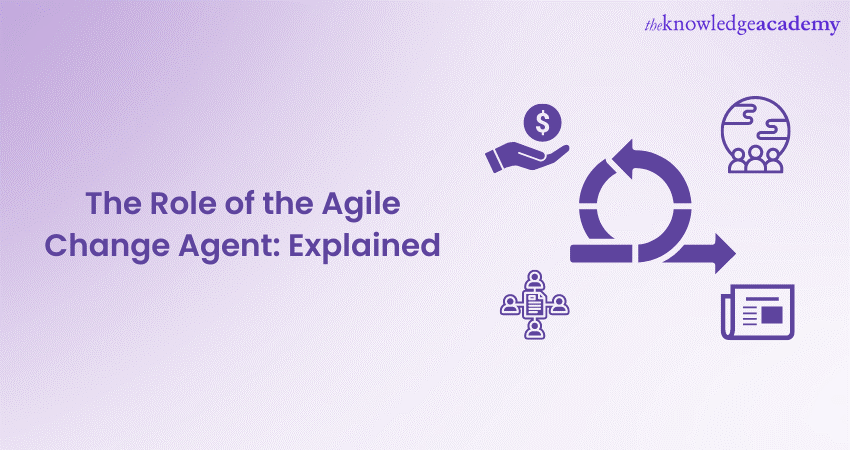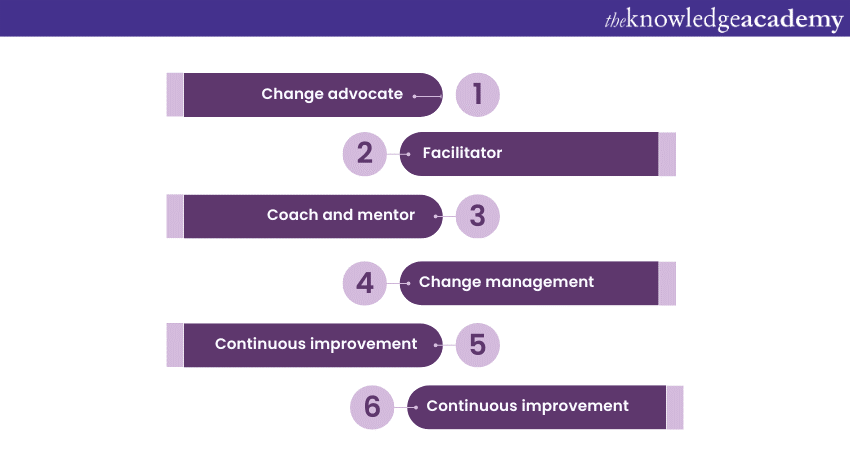We may not have the course you’re looking for. If you enquire or give us a call on + 1-866 272 8822 and speak to our training experts, we may still be able to help with your training requirements.
Training Outcomes Within Your Budget!
We ensure quality, budget-alignment, and timely delivery by our expert instructors.

The Role of the Agile Change Agent is crucial in driving successful organisational transformations. In today's fast-paced and ever-changing business landscape, where adaptability and agility are paramount, they are pivotal in facilitating change and fostering a culture of continuous improvement. They possess a deep understanding of agile principles, frameworks, and change management techniques, enabling them to guide organisations through the transformation process. They empower organisations to thrive in dynamic environments and embrace change as a competitive advantage by advocating for change, facilitating collaboration, coaching teams, and effectively managing the transformation journey. Read this blog to explore and understand the Role of the Agile Change Agent and their various responsibilities.
Table of Contents
1) Understanding the Agile Change Agent
2) Roles and responsibilities of Agile Change Agent
a) Change advocate
b) Facilitator
c) Coach and mentor
d) Change management
e) Influencer and communicator
f) Continuous improvement
3) Conclusion
Understanding the Agile Change Agent
The Agile Change Agent catalyses organisational change, advocating and implementing methodologies and practices. They deeply understand agile principles, frameworks such as Scrum or Kanban, and change management techniques. Their primary responsibility is to guide the organisation through the transformation process, ensuring a smooth transition from traditional to agile practices.
An Agile Change Agent is not just a project manager or a scrum master; they go beyond the technical aspects and focus on the cultural and mindset shift required for successful adoption. They recognise that agility is not merely a set of practices but a way of thinking and working that promotes adaptability, collaboration, and continuous improvement.
Explore the core Agile principles that drive successful project management. Learn how to apply them today!
They are well-versed in agile values, such as customer collaboration, responding to change, and delivering value iteratively. They understand the importance of cross-functional teams, self-organisation, and embracing feedback to drive innovation and efficiency.
Moreover, they possess strong facilitation and communication skills. They can navigate complex organisational dynamics, effectively engage stakeholders at all levels, and create an environment conducive to collaboration and learning. They actively listen to concerns and address resistance, fostering a sense of psychological safety and trust among team members.
The Agile Change Agent is not a one-size-fits-all role. They adapt their approach to the unique needs and challenges of the organisation. They collaborate with leaders, managers, and teams to identify the most suitable frameworks and practices that align with the organisation's goals and context.
They are knowledgeable and versatile professionals who deeply understands agile principles, frameworks, and change management. They are crucial in guiding organisations through the transformation process, ensuring a successful shift towards agility by promoting a cultural shift and fostering collaboration, adaptability, and continuous improvement.

Roles and responsibilities of Agile Change Agent

The Agile Change Agent assumes several key roles and responsibilities in driving successful organisational transformations. They act as catalysts for change, facilitating the adoption of such methodologies and practices while guiding the organisation through the transformation process. Let's delve into examining The Role of the Agile Change Agent:
Discover the different types of Agile methodology and find the best fit for your project. Learn more now!
Change advocate
One of their primary responsibilities is to act as a change advocate. They champion the benefits of agility, create awareness about the need for change, and align stakeholders with the transformation goals. Effective communication and storytelling help individuals and teams understand the value and relevance of embracing such practices. They address concerns and provide support throughout the transformation journey, fostering a positive and receptive attitude towards change.
Facilitator
They are facilitators, enabling collaboration and effective communication among teams. They organise and facilitate workshops, retrospectives, and other processes to promote transparency, learning, and continuous improvement. Encouraging cross-functional collaboration ensures that teams work together cohesively towards shared goals. They create an environment where individuals feel safe to voice their ideas, share feedback, and engage in constructive discussions, driving innovation and problem-solving.
Coach and mentor
They act as coaches and mentors, guiding teams and individuals on such practices. They help teams understand agility's fundamental principles and values, such as self-organisation, empowerment, and delivering value iteratively. They guide agile frameworks and tools, facilitating the adoption and implementation process. By fostering a culture of continuous learning, they inspire teams to embrace the agile mindset, experiment with new ideas, and continually improve their processes.
Become familiar with change management and agile approaches. Join our Agile Change Agent course today.
Change management
Managing change is a critical responsibility of an Agile Change Agent. They develop change management strategies tailored to the organisation's context, assess risks, and create plans to minimise resistance and maximise adoption. They collaborate with stakeholders to establish clear goals and metrics for measuring the success of the transformation. Throughout the process, they monitor progress, gather feedback, and make necessary adjustments to ensure the smooth implementation of agile practices. They also address any resistance or challenges, supporting and guiding teams and individuals.
Influencer and communicator
Agile Change Agents are skilled influencers and communicators. They can navigate complex organisational dynamics, engage stakeholders at all levels, and build trust. They communicate the vision and benefits of agile transformation, ensuring that all individuals understand their roles and contributions to the change. They actively listen to concerns, provide clarifications, and address any resistance or scepticism. By fostering a culture of open dialogue and collaboration, they promote shared ownership of the transformation process.
Continuous improvement
They promote a culture of continuous improvement within the organisation. They encourage teams to reflect on their processes and outcomes, identify areas for improvement, and experiment with new approaches. They facilitate retrospectives and encourage using such tools like visual boards and metrics to track progress and identify bottlenecks. They support teams in implementing feedback loops and adapting their practices based on lessons learned, driving efficiency and effectiveness.
The Role of the Agile Change Agent is multi-faceted and essential for driving successful organisational transformations. They serve as change advocates, facilitators, coaches, and mentors, empowering teams to embrace agile practices and foster a culture of continuous improvement. By effectively managing change, influencing stakeholders, and promoting collaboration, they are pivotal in guiding organisations towards agility and enabling them to thrive in dynamic environments.
Kick start your project management journey with our Agile Project Management Foundation & Practitioner (AgilePM®) course. Join now!
Conclusion
We hope you enjoyed reading this blog explaining The Role of the Agile Change Agent. In the modern workplace, change is an integral part of business operations, and companies should have access to the right resources to introduce and manage the change effectively. They can help the company manage the change and enhance its operations.
Learn the agile approaches widely used in the software development industry. Join our Agile Training courses today!
Frequently Asked Questions
Upcoming Project Management Resources Batches & Dates
Date
 Agile Change Agent
Agile Change Agent
Thu 23rd Jan 2025
Thu 27th Feb 2025
Thu 27th Mar 2025
Thu 29th May 2025
Thu 3rd Jul 2025
Thu 4th Sep 2025
Thu 6th Nov 2025







 Top Rated Course
Top Rated Course


 If you wish to make any changes to your course, please
If you wish to make any changes to your course, please


